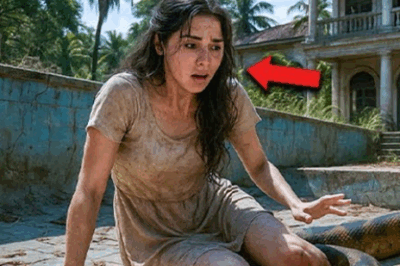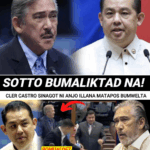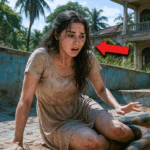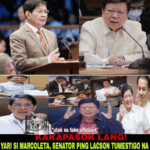
For more than four decades, “Eat Bulaga!” was not just a television program; it was a Filipino institution, a daily ritual, and, as it repeatedly told its audience, a “family.” It was the constant, comforting presence in a nation of constant change. At the head of this family were the patriarchs: Tito Sotto, Vic Sotto, and Joey de Leon. And at their side were the “dabarkads,” a revolving but deeply loved cast of co-hosts who became like older siblings and aunts and uncles to the entire country.
But in the past year, that family has been shattered. The public, painful, and litigious split from their long-time producer, TAPE Inc., was a corporate earthquake. The move to a new home on a new network was the aftershock. And now, the “civil war” has begun.
The unwritten rule of a family feud is that it stays within the family. That rule has just been obliterated.
In a stunning and explosive development, one of the show’s most beloved and tenured legends, Jimmy Santos, has just entered the fray. He has broken his characteristic, quiet demeanor to unleash a furious “resbak”—a Filipino term for a counter-attack or retaliation—against a former member of the family: Anjo Yllana.
The reason for this sudden, shocking outburst? The “paninira,” or slander, allegedly being perpetrated by Yllana against the family’s patriarch, Tito Sotto.
This is not just another showbiz spat. This is a war over loyalty, legacy, and the very definition of the “Eat Bulaga!” family.
To understand the magnitude of this, one must first understand the players. Anjo Yllana was a “dabarkads” for over two decades. He was a staple of the show, a “kuya” (older brother) figure whose comedic timing and integration into the cast made him synonymous with the brand. Since the split, however, Yllana has been vocal, making statements that have been widely interpreted by TVJ loyalists as critical, ungrateful, and disrespectful. He chose not to join TVJ in their new home, and his subsequent comments have been seen as a justification for that move, one that many feel has crossed the line into active “slander” against his former bosses.
His target, Tito Sotto, is not just a TV host. He is a formidable political figure, a former Senate President, and the “Tito” (uncle) of the nation, both literally and figuratively. An attack on him is seen not just as a professional disagreement but as a deep, personal betrayal of a man who served as a mentor and employer for decades.
Enter Jimmy Santos.

If Tito Sotto is the patriarch, Jimmy Santos is the loyal old guard. He is a legend in his own right, a man who has been with “Eat Bulaga!” through its golden eras. His persona is that of the lovable, often bumbling, gentle giant. He is not a provocateur. He is not known for starting wars or engaging in public feuds. He is the quiet presence, the man whose loyalty was never in question.
That is why his “resbak” is so devastatingly effective.
When a man who is known for his silence finally chooses to speak, his words carry the weight of a thousand unspoken thoughts. Santos’s attack on Yllana is not just a difference of opinion; it is a moral judgment. It is the voice of the “original” dabarkads, the loyalists who stayed, the ones who believe in “utang na loob”—a debt of gratitude that, in Filipino culture, is unbreakable.
By accusing Yllana of “paninira,” Santos is drawing a bright, red line in the sand. He is publicly declaring Yllana a traitor to the family. He is not just defending Tito Sotto; he is defending the entire institution of loyalty that “Eat Bulaga!” was built on. He is, in effect, speaking for the silent majority of the cast, the ones who have felt the sting of Yllana’s words but have, until now, chosen to stay out of the mud.
This confrontation is a microcosm of the entire, painful “Eat Bulaga!” divorce. For the public, this feud is agonizing because it feels so personal. We are watching people we grew up with, people who ate lunch with us in our living rooms for forty years, tear each other apart.
Yllana’s alleged statements tap into a painful narrative: that perhaps the “family” was not as perfect as it seemed. That perhaps the patriarchs were not the benevolent figures they were portrayed to be. This is the narrative that Santos is now furiously trying to dismantle.
His “resbak” is a defense of Sotto’s honor. It implies that Yllana’s claims are, at best, ungrateful and, at worst, outright lies. It is a challenge: “How dare you?” How dare a man who built his career, fed his family, and enjoyed decades of fame, all thanks to the platform given to him by Sotto and his brothers, turn around and “slander” that very man?

This is a cultural battle. The Filipino value of “pakikisama” (getting along) and respect for elders is clashing with a modern desire to “speak one’s truth.” For Jimmy Santos, who comes from an older generation, Yllana’s actions are an unforgivable breach of a sacred, unwritten contract.
The fallout from this is immediate. First, it has given the “Eat Bulaga!” feud a new, explosive storyline. This is no longer a boring legal fight over a copyright. This is a deeply personal, emotional war between former friends. This is the kind of drama that fuels the public imagination.
Second, it forces other “dabarkads,” both past and present, into a difficult position. To stay silent is to risk being seen as agreeing with Yllana. To speak out is to join the war. Jimmy Santos has, perhaps intentionally, become the “whip,” forcing everyone to show their cards. He has become the vocal conscience of the loyalist camp.
Third, it puts Anjo Yllana in a corner. He is no longer just a critic; he is now a “slanderere” who has been publicly called out by a revered legend. If he responds, he risks looking even more disrespectful, fighting with an “elder” like Jimmy Santos. If he stays silent, he appears weak, his accusations neutralized by this powerful, emotional counter-punch.
This is the sad, bitter, and “human” side of a corporate split. The contracts and copyrights are just paper. The real damage is being done to the relationships, to the “family” that an entire nation felt a part of. Jimmy Santos, the gentle giant, has just thrown the heaviest punch, not with his fists, but with his words. And it was a punch thrown in the name of loyalty, a concept that, in this bitter war, is now the only currency that matters. The old guard is not just watching; they are fighting back.
News
Ang Hapunan ni Sultan
Ang Mansyon de las Serpientes ay hindi isang ordinaryong tahanan. Ito ay isang dambuhalang monumento ng kapangyarihan ni Don…
Ang Halaga ng Isang Tasa
Ang “The Daily Grind Cafe” ay isang maliit na isla ng karangyaan sa gitna ng magulong abenida ng Maynila….
Ang Kontrata ng Kaluluwa
Ang amoy ng mamahaling pabango at lumang kahoy ay hindi kailanman umabot sa basement ng mansyon ng mga Elizalde….
Ang Halaga ng Isang Nakaraan
Ang Sandoval Tower ay hindi lang isang gusali; ito ay isang pahayag. Bumubutas ito sa langit ng Makati, isang…
End of content
No more pages to load












